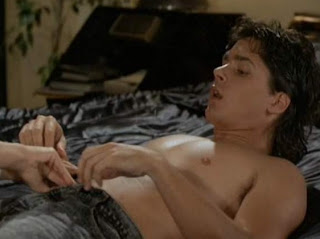 Some teen idols never grow up. As the years pass, they may hone their acting skills and take on more mature roles, but they never lose their youthful exuberance, their passion, or their innocence. Every day they wake up newly surprised that they are the object of someone's desire.
Some teen idols never grow up. As the years pass, they may hone their acting skills and take on more mature roles, but they never lose their youthful exuberance, their passion, or their innocence. Every day they wake up newly surprised that they are the object of someone's desire.It's a short list. I would include Shaun Cassidy, Robby Benson, Mario Lopez, and certainly Billy Warlock.
Born in 1961, Billy burst into the picture in 1982, during the last season of Happy Days, hired to up the beefcake quota of the doddering sitcom by wearing a trademark cut-off t-shirt. The teen magazines went crazy, and soon Billy's pin-ups were pushing aside such luminaries as Scott Baio and Ralph Macchio.
1. The teenage Bill (Billy Warlock) feels that he is an outsider, not quite fitting in. Gay kids could relate.
2. Although he enjoys the company of woman, Bill enjoys some strong buddy-bonding and rescue moments with his friend Milo (Evan Richards)
3. A woman seduces Bill by ripping off his pants. They kiss passionately. While this is occurring, the camera is aimed directly at his briefs. You can imagine what happens next.
For three seasons (1989-1992), Billy played lifeguard Eddie Kramer on the beefcake- and cheesecake-heavy Baywatch. After that he specialized mostly in soaps:
Days of Our Lives (1988-1991, 2005-2006)
General Hospital (1997-2003)
The Young and the Restless (2007-2008)
As the World Turns (2010)
One Life to Live (2010)
But Billy is more than a great set of pecs. He is deeply involved in social issues, including gay rights. A gay ally, in 2004 he made his Broadway debut, playing a gay writer who becomes one of the first casualties of the AIDS pandemic in The Normal Heart.







